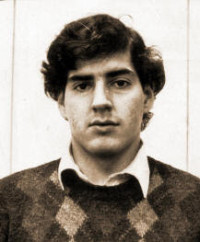Note: Our accounts contain the personal recollections and opinions of the individual interviewed. The views expressed should not be considered official statements of the U.S. government or the Association for Diplomatic Studies and Training. ADST conducts oral history interviews with retired U.S. diplomats, and uses their accounts to form narratives around specific events or concepts, in order to further the study of American diplomatic history and provide the historical perspective of those directly involved.
During a 1986 protest in Santiago, Chile against the human rights abuses of Augusto Pinochet's regime, teenagers setting up barricades were arrested by a military patrol. What happened next to Rodrigo Rojas DeNegri (seen right) and Carmen Quintana is a matter of dispute, but in the end, Rojas was dead and Quintana severely burned. An official Chilean report claimed that Rojas, an American legal resident, and Quintana, an engineering student at the University of Santiago, were carrying Molotov cocktails which broke, setting them on fire.
Quintana maintains that both were brutally beaten by the army patrol, soaked with gasoline, set on fire and dumped in a ditch. Rojas died of his burns and injuries. In 2015, seven Chilean army officers were charged in connection with the killing of the 19-year old Rojas and attempted homicide of the 18-year old Quintana.
Chile was in a state of political upheaval during this era. Mass protests demanding democratic reforms were commonplace and many erupted into violence. The U.S.-Chile relationship was strained. In Washington, some supported the containment of communism at any cost while others demanded that the U.S. challenge human rights abuses in countries such as Chile which benefited from American support. The incident on July 2, 1986 during which the teenagers were beaten and burned exacerbated these tensions.
This account was compiled from interviews by ADST with George F. Jones (interviewed August 1996), Deputy Chief of Mission at Embassy Santiago, Harry Barnes Jr (interviewed April 2001), U.S. Ambassador to Chile, and Elizabeth Barnes, Harry's wife. 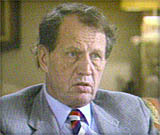 Read the entire Moment on ADST.org. This account was edited by Jesse Berman.
Read the entire Moment on ADST.org. This account was edited by Jesse Berman.
E. BARNES: It was 1986, and Rodrigo Rojas DeNegri was a photographer, an émigré from the Chilean coup who was now living in Washington, D.C. Rodrigo was anxious to participate and decided to visit his home country for the first time since his exile -- as his mother later said -- with "the idea of knowing his people, to find his roots. He was always dreaming of Chile."
It was early morning in Chile on the second of July when he joined the protest - a group of young people setting up a barricade of old tires in one of the neighborhoods of Santiago. He'd also brought his camera and was taking pictures, when suddenly a Chevrolet truck appeared, spilling out uniformed men with blackened faces.
All except Rojas and a young Chilean woman named Carmen Gloria Quintana managed their escape. But Carmen stumbled and when Rojas returned to help her, the soldiers seized the young pair and began beating them. And then, using a flammable liquid, the two were doused and set ablaze. In flames and unconscious, wrapped in blankets, they were loaded into the truck and driven away.
Workers wandering home that afternoon found them lying in a ditch. Horrified and frightened, they called the police. And only then, late in the day, were Carmen and Rodrigo taken to the nearest hospital. Since Rodrigo Rojas was a resident American, our embassy was informed.
JONES: There were a series of occasions when we visited people in prison, usually people who had some connection with the United States in one way or another. Neither the Ambassador nor I went, but we sent an Embassy officer to visit them, and this was noticed and reported. Of course the most notorious thing which brought Barnes -- grief is too strong a word, but it certainly brought him enormous controversy, was in July of '86.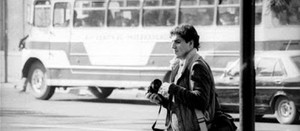
There were some demonstrations in the streets of Santiago. Two Chilean teenagers, a boy and a girl, were intercepted by a Chilean army patrol. The patrol obviously suspected them of participating in the demonstrations. The girl may in fact have participated.
But it's clear that the boy was simply there as a photographer. He was carrying a camera; he was an amateur photographer. At any rate, this patrol decided they had caught a couple of these communists who were causing all this disturbance, and they poured gasoline on them and set fire to them. The girl was badly burned; the boy was killed.
Unfortunately for the Chilean army, the boy was a legal permanent resident of the United States and had been attending a high school in Maryland, I think, with the son of Charlie Hill, who was George Shultz's personal assistant. This was the Rodrigo Rojas case.
H. BARNES: We were in touch with the mother of the young man and also in touch with the young woman who survived. A couple of days later there was a funeral mass at the cathedral for the young man, and my wife and I went to that.
Among the people who heard about it was then the senior U.S. senator from the North Carolina, Jessie Helms. Within four or five days he decided he would come to Chile and investigate for himself why it was that the, as he put it, "the American flag had been displayed at the funeral service for a terrorist." One of the worse interviews I ever had was with Jessie Helms and his staff.
Essentially I got a grilling from him and his staff and I know my responses did not satisfy him. But what it did was to produce even more than what I already had in the way of support in the Congress, and the Administration was very good about supporting me.
[From Helms' perspective,] Pinochet was a friend. He was anti-communist. He had overthrown a communist regime, the Allende regime. He was a good guy; somebody that needed to be supported.When we learned of his critical condition, I remember my husband's frantic efforts to get him transferred to the burn pavilion at the Hospital de Trabajadores. Those demands were obstructed by the doctors at the hospital where Rodrigo had been taken.
Harry and I were not the only foreigners at the funeral. Ambassadors and representatives from France, Spain, Belgium and Italy had come to the church to pay their respects and to demonstrate their repugnance for this crime.
We remained after the service, waiting just inside the building where we could look out at the packed streets. There was little room for movement out there, only a silent, waiting crowd. Breaking an understanding with the church, an officer and a policeman forced their way into the crowd. Remarkably, the only disturbance was that the officer lost his hat, but our friend noticed that the police then withdrew.
He presumed this was a signal, because almost immediately two trucks began to inch their way into the crowd, one vehicle decked with a water cannon. When the cannon fired, a blast of water flattened wherever it aimed, and those caught in the confines of that constricted area had nowhere to go. Then came the tear gas. You read about it - it doesn't aim to kill, only to disperse. But this crowd was trapped within those narrow streets as we were trapped inside our little room.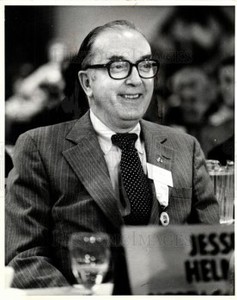 Rodrigo Rojas was barely in his grave when Jesse Helms, the Republican senator from North Carolina and a friend of Augusto and Lucia Pinochet, arrived at the airport. The Senator had decided he would come to Chile and investigate for himself why it was that "the American flag had been displayed at the funeral service for a terrorist."
Rodrigo Rojas was barely in his grave when Jesse Helms, the Republican senator from North Carolina and a friend of Augusto and Lucia Pinochet, arrived at the airport. The Senator had decided he would come to Chile and investigate for himself why it was that "the American flag had been displayed at the funeral service for a terrorist."
JONES: As usual, Pinochet was determined to manipulate the occasion. A photographer got a picture of Harry in a room in which there was a big floral wreath from the Communist Party. The right wing's version of this was that the Ambassador clearly had declared his allegiance to the extreme left of Chile by going to this radical's funeral.
Both of these young people had leftist connections. That's why they had been watching the street demonstration, which had been organized by the extreme and near-extreme left.
The funeral led to Senator [Jesse] Helms' visit to Chile shortly thereafter, a visit which he made totally unannounced. We learned from the Chilean Government that he was there; even the State Department didn't know. Harry sent a note over to his hotel and welcomed him to Chile and said he was at his service and asked if there was anything he could do.
No response for several days. Finally on Saturday morning, he received a phone call from one of the Senator's aides saying the Senator would like him to come to the hotel and meet with him. So he went off to see him.
Harry is one of the more unflappable people I know. This was one of the two or three occasions when I can remember his being visibly angry and visibly upset when he came back from that meeting. He was clearly treated in the most contemptuous manner. Helms and his aides had made up their minds that this was a left wing ambassador who had allied himself with left wing causes and was trying to undermine this noble government which was doing so much good for Chile. It must have been a very unpleasant interview.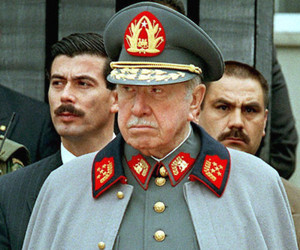 But there was a still more interesting follow on to this whole saga. A few days later, Bob Gelbard, the Deputy Assistant Secretary for Inter-American Affairs, came down to Chile on a visit, and Harry took him over to call on the director of Chilean intelligence, who was an army general, and one of the very few political generals, the only one who would ever dare to discuss politics with us.
But there was a still more interesting follow on to this whole saga. A few days later, Bob Gelbard, the Deputy Assistant Secretary for Inter-American Affairs, came down to Chile on a visit, and Harry took him over to call on the director of Chilean intelligence, who was an army general, and one of the very few political generals, the only one who would ever dare to discuss politics with us.
He and the station chief had a good relationship, did a lot of sparring, but you could at least talk to this guy. So many of the Army generals you couldn't even get in to see, and when you got in to see them it was usually to discuss some military visit, some exchange program, and just that and nothing more.
But General Gordon apparently had some sort of license from Pinochet (seen right) to go a little further than that. So he was a regular contact. In the course of the conversation he said," What is this I hear from Senator Helms about your having a Chilean Army report, a report of the Chilean Army investigation that allegedly establishes that it was an army patrol that burned the two teenagers?"I'm sure they kept stone faces; Harry's poker face was very good. But wild alarm bells began ringing because we did in fact have a copy of a Chilean Army report which had been obtained through intelligence channels.
It is one of the very few times when I've seen a station chief absolutely pale with panic when he got back to the embassy because one of his very good sources inside Chilean intelligence for all he knew was about to be blown sky high. He could be taken away and tortured, shot, anything. The Ambassador of course got on the secure phone to Washington immediately.
It turned out that the CIA had in fact briefed a staffer of Senator Helms about the existence of this report. Given his well-known publicly stated interest about these events in Chile, the agency thought he should be aware of the existence of this report in which the Chileans themselves had concluded that this lieutenant who commanded this patrol had on his own decided to terminate these teenagers with extreme prejudice.
The staffer had of course briefed Helms. Who exactly it was who called Chile probably will never be known, because I suspect other staffers were told. Although General Gordon was very specific when he said Helms, I suspect it was one of his staffers who called. Helms' office of course denied that anyone had said anything to the Chileans, and this was a gross calumny and atrocious lie intended to besmirch his reputation.
E. BARNES: Helms, the second-ranking member of the Senate Foreign Relations Committee, spoke with the voice of God. Known for his righteous and vocal adherence to certain issues - he was opposed to civil rights, to gay rights, to foreign aid, to modern art - that righteous wrath at this moment in time was directed at my husband.
Helms's first opportunity was an interview with a state-run television station: "Harry Barnes has planted the American flag in the midst of a Communist activity. If President Reagan were here, I believe he would send this Ambassador home. Barnes had notified the Department of State of the burnings in a manner calculated to produce criticism of the Chilean regime. Except for Barnes and his wife and the French Ambassador, everybody at that funeral belonged to the extreme left. I don't wonder that the Chilean people asked whose side this man is on."

